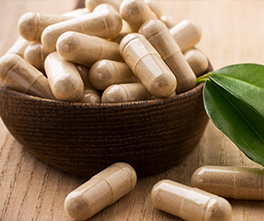
A herb is a plant or a part of a plant that has curative properties. They are also often used for their scent or flavor enhancing effects. Herb based products are widely used as dietary supplements. The latter, as the name suggests are taken to ensure that one’s nutritional needs are being met and apart from herbs also include vitamins, minerals, enzymes, tablets, capsules to name a few.
Herbs, like all plants, create a number of chemical compounds as by-products of natural processes. For instance, the process of energy production is accompanied by the production of chemical compounds. Also, plants produce chemical compounds in the form of toxins to keep parasites and animals at bay. While some of the chemical compounds can be utilized to produce healing or therapeutic effects, others might actually adversely affect human beings. In most cases, it is difficult to isolate the ingredients which lend medicinal properties to the herb. Herbs contain an amalgamation of ingredients, and it is possible that all of them work simultaneously to produce the desired medicinal effect.
So what are herbal supplements? Herbal supplements are essentially derivatives of plants and their medicinal and healing properties make them effective in treating a range of conditions such as common cold, hemorrhoids, varicose veins, to relieve symptoms associated with menopause like hot flashes, anxiety, depression and so on. There are many factors which determine how effective an herbal supplement will be. For instance, whether the supplement contains all the active constituents and their ratios as compared to the natural herb. Herbs generally contain a variety of active compounds that interact with one another and in the process produce therapeutic properties. The herbal products that are sold in the market might contain all the compounds or in some cases, only those which could be successfully extracted.
Herbal products are sold as capsules, pills, powder which is consumed orally and also as topical preparations such as shampoos, ointments etc. They are also used as ingredients in many tinctures. Tinctures may vary in terms of concentration and are prepared by soaking the herb in a solution of water and alcohol. Herbal teas are also becoming increasingly popular. For instance, Chamomile tea is often used as a sleep aid or Echinacea tea is used to alleviate symptoms of a cold. In tablet form, supplements contain a single or a group of chemicals extracted from the plant. For instance, phytoestrogens are obtained from soy products. An extract is made by soaking the herb in a liquid that removes specific types of chemicals. The liquid can be used as is or converted into a dry extract through the process of evaporation, which is then used in capsules or tablets. Liquid extracts offer maximum potency since in this form the active ingredients are well-preserved.
Essential oils are also derived from herbs and have many uses. They are volatile compounds which carry the characteristic fragrance of the herb from which they are extracted. Essential oils are highly concentrated and as such, they need to be diluted before use. Examples of essential oils are lavender oil, peppermint oil, lemon oil to name a few. Their uses range from using them to reduce swelling and pain, relieve allergy symptoms, prevent motion sickness to being used extensively in aroma therapy.
